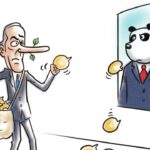Editor’s Note:
This year marks the 10th anniversary of the Belt and Road Initiative (BRI) proposed by Chinese President Xi Jinping. Through the lens of foreign pundits, we take a look at 10 years of the BRI – how it achieves win-win cooperation between China and countries along the Belt and Road and how it increases people’s sense of fulfillment in these countries.
“The BRI and collaborating with China appear to offer more promising prospects, as China is open to engaging with other countries without seeking dominance or control over their internal policies, unlike some Western nations,” said Levente Horvath (Horvath). Horvath is director of Eurasia Center of John von Neumann University, Hungary. He is former consul general of Hungary in Shanghai, and chief advisor to the governor of the Central Bank of Hungary. In an interview with Global Times (GT) reporter Wang Wenwen, he shared views on the development of the BRI over the past decade, Hungary’s role as a hub between the East and the West, and China-Central and Eastern Europe cooperation.
This is the ninth piece of the series.
GT: What do you think of Hungary’s role as a hub between the East and the West?
Horvath: Throughout history, Hungary has always been a bridge between the West and the East. During the Cold War, Hungary was a statellite state of the Soviet Union. However, after the dissolution of the Soviet Union in the 1990s, Hungary began to strengthen its ties with Western countries, becoming a member of the European Union and the Schengen Area.
In the 21st century, we continue to see ourselves as a potential bridge between these two regions. Why do we think this way? It’s because we’ve recognized that in the 21st century, the world order is undergoing significant changes. The previous unipolar world order, where the US and Western countries were the dominant powers, is shifting. Asian countries are rapidly developing and gaining strength not only economically but also in culture, technology, innovation, politics and even in the military field. They are becoming a vital part of the new world order. I refer to this new world order as the “Eurasia era.”
I believe that Eurasia connectivity is of utmost importance. Over the past 70 years, we have seen that the EU and Western European countries also desired connectivity between Europe and Asia. However, they may not have had the strong economic and political background required to establish this connectivity.
In 2013, China announced the Belt and Road Initiative. We consider this connectivity vital and are delighted to participate in this collaboration between the EU and Asia.
Hungary has a very good relationship with China. Over the past 12 years, there has been strong trade and investment cooperation between the two countries. Chinese companies are the largest investors in Hungary, and when it comes to foreign investment, the No.1 country is usually China, sometimes South Korea. The European and Chinese train connection can play a crucial role in facilitating trade between these nations. It not only benefits Hungary but also contributes to building a broader network between the EU and Asia.

Levente Horvath Photo: Courtesy of Horvath
GT: What progress has the BRI made over the past 10 years globally?
Horvath: As evident in the Eurasia sector, the BRI presents significant opportunities for many countries, especially those in Central Asia and between Asia and Europe, particularly those not situated near the coastline. Regions located by the seaside tend to be wealthier historically, such as Shanghai, Beijing and other coastal cities in China. However, with the advancement of technology and the development of a fast and efficient train network, landlocked regions can now become more integral to world trade.
In Hungary and at our Eurasia Center, we see the significance of the BRI goes beyond economic aspects like trade, investment, finance, and people-to-people exchange. Therefore, the Hungarian government became the first country in the EU to participate in the BRI.
In my research, I always emphasize the importance of understanding other civilizations. Nowadays, we often witness a mindset in Western countries where they consider themselves as the civilized group, and everyone outside the Western civilization is perceived as less civilized or of lower grade. This perspective is not conducive to fruitful cooperation. I always stress the significance of understanding others and using the sentence of Sun Tzu that know the enemy and know yourself, and you can fight a hundred battles with no danger of defeat. It is crucial for people to comprehend other cultures, histories and ways of thinking. This understanding prevents misunderstandings about their actions, policies, and intentions. For instance, the BRI may be misperceived as colonization, but it is actually about Chinese interests and a desire for win-win cooperation.
GT: The EU proposed the Global Gateway and the US has the Build Back Better World project to counter the BRI. How do they differ from the BRI?
Horvath: Indeed, the US has decided not to participate in the BRI. Among the US allies, Japan is the only country that has also chosen not to participate, while several other Western European countries like France, Germany and the UK are involved in the initiative or are founding members of the Asian Infrastructure Investment Bank.
As we move into the 21st century, the global landscape is undergoing significant changes. The EU is exploring alternative opportunities instead of the BRI, and the US has proposed its Build Back Better World project as an alternative approach. The key distinction lies in China’s willingness to allocate more funds to invest in other countries and regions. While the immediate importance of these projects might not be evident for China, they hold great long-term potential for both China and other participating nations.
Take, for instance, the Budapest-Belgrade Railway. From China’s current perspective, it may not appear as a high-priority project. However, in the next 10 years, once this comprehensive network is established, it will become a crucial component of the BRI. For Hungary and Serbia, this railway holds immense significance. For decades, these countries in Central and Eastern Europe have aspired to establish a railway connecting the north and south regions.
Until now, the Central Eastern European countries (CEEC) have had railways connecting east and west, enabling them to transport goods to the west easily. However, trading between these countries and the coastal nations has been less efficient. The BRI presents a promising opportunity for both us and China, fostering win-win cooperation. However, the EU and the US seem to view cooperation differently. They often approach it as a zero-sum game. I believe that such thinking might not be conducive to strong and positive collaboration. Western countries may offer alternative opportunities, but they represent a small portion of the world’s 8 billion people. In Asia alone, there are numerous countries, people and territories that can engage in fruitful cooperation with China. Considering this, the BRI and collaborating with China appears to offer more promising prospects, as China is open to engaging with other countries without seeking dominance or control over their internal policies, unlike some Western nations.
GT: China-Europe relations are currently facing some challenges. What do you think of China-CEEC cooperation in the current situation?
Horvath: China actually needs a unified and coherent EU as a reliable counterpart, but the EU might currently face some challenges in strength and stability. The EU’s complex structure, with multiple leaders, can sometimes make it challenging for other countries to know who to contact for discussions. And China is not attempting to divide the EU, as it views the EU as its largest and strongest trade partner.
In fact, back in 2012, the China-CEEC cooperation was not initially announced or promoted by the Chinese side. Instead, it was more of an initiative driven by the CEEC themselves, who sought to establish an open China-CEEC cooperation. China responded positively, expressing openness to various forms of cooperation. Initially known as 16+1, the cooperation involved 16 CEEC and Greece, making it 17+1. However, later, the Baltic countries, Estonia, Lithuania, and Latvia exited, making it 14+1. Nonetheless, I still view this cooperation as a positive opportunity.
Every year, bilateral meetings and cooperation events take place among the participating countries. However, the diverse nature of the CEEC, with some being EU members and others not, some using the euro while others not, and varying cultural differences from north to south, can pose challenges to seamless collaboration. For instance, Hungary is an agricultural country, but others may have different economic focuses. During my tenure as the consul general of Hungary in Shanghai from 2015 to 2017, I observed that the CEEC were also competitive with each other. Instead of uniting for better cooperation with China, they sometimes competed against one another to secure investments and trade deals with China. It seemed that they were using the platform merely as a means to pursue individual interests rather than acting as a cohesive group.
GT: There has been quite a lot of noise about the term “de-risking” in the EU. What will “de-risking” truly bring to the EU?
Horvath: It is not good for Europe. We can observe the effects of decoupling, as witnessed during the Russia-Ukraine war when the EU decided to stop importing Russian oil and gas. The EU believed this move would harm Russia’s economy and weaken its position. However, in the end, it turned out to be a bigger disadvantage for the EU. We faced higher costs for oil, gas and other goods, having to purchase them from the US at significantly higher prices. Russia, on the other hand, managed to find new markets, such as China and India, to sell its resources.
The EU’s economic crisis, financial crisis, and the impact of the oil and gas crisis were severe consequences of this decision. As a result, some EU leaders, including French President Emmanuel Macron, have voiced their concerns about participating in an economic war between the US and China, as well as involving themselves in Taiwan-related issues, which are not their conflicts.
While smaller in size compared to France, Hungary’s government is growing in importance within the EU. Of course, President Macron’s stance holds significant weight, given his leadership position in France. Nevertheless, there seems to be a growing realization among EU leaders that cooperating with China is vital. China is not only the EU’s largest trade partner but also plays a crucial role in global trade. Hence, risking cooperation with China would be an ill-advised decision for the EU.













